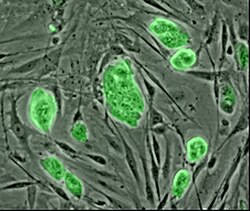The successful development of stem cells has all kinds of medical implications. They can be used to grow replacements for all kinds of diseased cells and can treat a wide range of diseases with personalized body tissues. Thus, this stem cell development has the potential to treat everything from diseased blood cells to diseased brain cells to patients with Alzheimer's disease to diabetic people.
 However, in addition to the medical advantages of stem cells, this development also means that humans now have the ability to clone themselves. And as cool as this may sound, it also brings to light many ethical questions. Many, if not most scientists have flatly declared human cloning unethical and scientifically irresponsible. That being said, it is hard to imagine that no one will go ahead and do it with the knowledge and methodology of human cloning now available. 13 states currently ban reproductive cloning (human clones), and seven states ban "therapeutic cloning," which is cloning for medical treatment (i.e. growing a replacement organ). However, the federal government has yet to set restrictions or determine legality of either practice.
However, in addition to the medical advantages of stem cells, this development also means that humans now have the ability to clone themselves. And as cool as this may sound, it also brings to light many ethical questions. Many, if not most scientists have flatly declared human cloning unethical and scientifically irresponsible. That being said, it is hard to imagine that no one will go ahead and do it with the knowledge and methodology of human cloning now available. 13 states currently ban reproductive cloning (human clones), and seven states ban "therapeutic cloning," which is cloning for medical treatment (i.e. growing a replacement organ). However, the federal government has yet to set restrictions or determine legality of either practice.So what do you guys think: How much cloning should be allowed? Should we allow therapeutic cloning and/or reproductive cloning, taking into account the ethics of such practices? Should human cloning legality and restrictions be left up to the states, or should there be national legislation regarding its usage?

7 comments:
This is really interesting. I don't think we should allow any cloning. Obviously, rules need to be set on the national level or else people will just move to a state where it is legal in order to clone. Cloning just seems a little weird to me and people may feel entitled to their own clone. Assuming people were cloning for organs, meaning using a clone to possibly safe a life, I still think it is wrong. This is really crazy to think that cloning is actually possible...
Somehow I don't think scientists have yet come up with a way to clone an entire human, so maybe that debate should be postponed. For now, I see no issue with using stem cells to clone individual organs and body parts so long as the organs and body parts aren't "harvested" from a conscious life form. If anything, this would be more ethical than having organ donors provide replacement organs. There may of course be safety concerns with using lab-produced organs, but that's an entirely different debate.
I agree with your view in regards to cloning individual organs and not harvesting them from living beings. I suppose I misread the blog.
I agree with Garrett in that creating and offering stem cell-made organs seems a lot more ethical than having organ donors donate parts of their bodies, especially since many donors are sometimes incapacitated and can't give formal permission themselves. However, I feel like reproductive cloning is a path to catastrophe and chaos. I say this, because if people are able to start with these "blank slates" and specialize lifeforms into having whatever special abilities or quirks they desire, then there could potentially be horrible incidents where "natural children" are ostracized by their families. Moreover, from an economic perspective, if every human being could be cloned and then modified to essentially excel at everything, then there would be a huge set of problems when identifying who really has the right skills sets and qualifications for certain jobs. This would remove the specialization and expertise that is critical to having a functioning and diverse capitalistic society. (I sort of view this issue through a science fiction/dystopian future perspective in which mankind will be taken over by "the perfect humans," so I hope you'll excuse me if this comment is a bit of a rant and is exaggerated.)
Because I feel that legislature regarding cloning would affect the whole country, I would have to say that this should be left up to the federal government.
I am kind of surprised that true cloning of humans is only banned by 13 states. I would think it would be more, however, as Garrett said, it is probably not possible yet. I believe it's a pretty taboo thing, actually trying to raise a human clone would be highly controversial because of the ethical considerations that Abby outlined above.
I think the use of stem cells to produce organs and damaged cells isn't a bad idea if it is safe. The book House of the Scorpion involves the (pretty self explanatory) ethical implications of creating true clones and then harvesting their organs. According to Wikipedia there will be a sequel to the book in September
Post a Comment